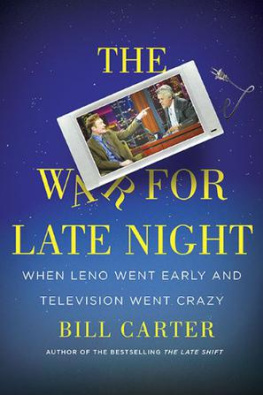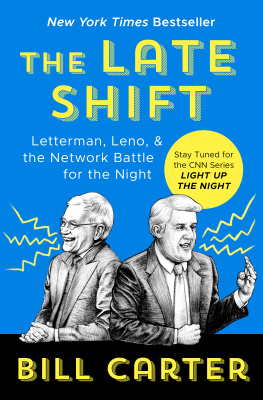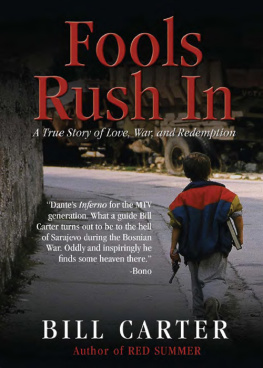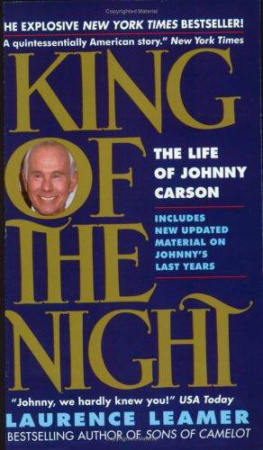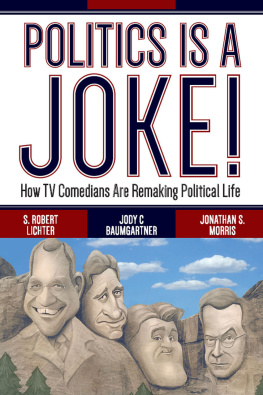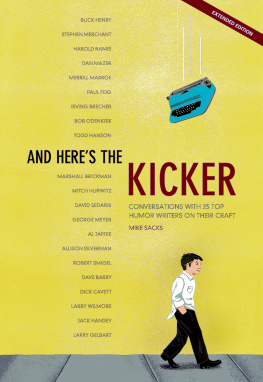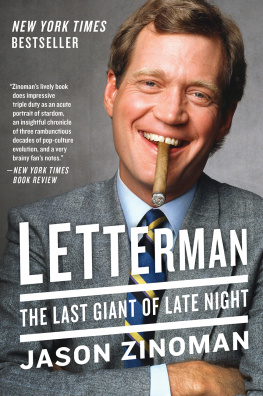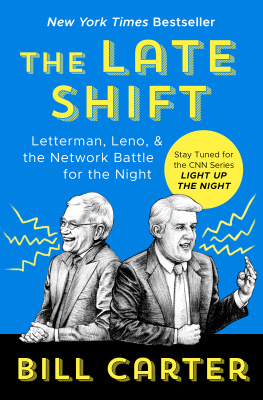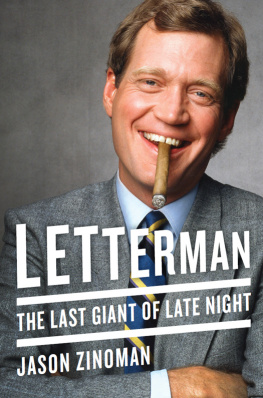Table of Contents
ALSO BY BILL CARTER
The Late Shift: Letterman, Leno, and the Network Battle for the Night
Desperate Networks
VIKING
Published by the Penguin Group
Penguin Group (USA) Inc., 375 Hudson Street, New York, New York 10014, U.S.A.
Penguin Group (Canada), 90 Eglinton Avenue East, Suite 700, Toronto, Ontario, Canada M4P 2Y3 (a division of Pearson Penguin Canada Inc.) Penguin Books Ltd, 80 Strand, London WC2R 0RL, England Penguin Ireland, 25 St. Stephens Green, Dublin 2, Ireland (a division of Penguin Books Ltd) Penguin Books Australia Ltd, 250 Camberwell Road, Camberwell, Victoria 3124, Australia (a division of Pearson Australia Group Pty Ltd) Penguin Books India Pvt Ltd, 11 Community Centre, Panchsheel Park, New Delhi - 110 017, India Penguin Group (NZ), 67 Apollo Drive, Rosedale, North Shore 0632, New Zealand (a division of Pearson New Zealand Ltd) Penguin Books (South Africa) (Pty) Ltd, 24 Sturdee Avenue, Rosebank, Johannesburg 2196, South Africa
Penguin Books Ltd, Registered Offices:
80 Strand, London WC2R 0RL, England
First published in 2010 by Viking Penguin,
a member of Penguin Group (USA) Inc.
Copyright Bill Carter, 2010
All rights reserved
Page 406 constitutes an extension of this copyright page.
LIBRARY OF CONGRESS CATALOGING IN PUBLICATION DATA
Carter, Bill, date.
The war for late night : when Leno went early and television went crazy / Bill Carter.
p. cm.
Includes index.
eISBN : 978-1-101-44342-2
1. Tonight show (Television program) 2. Television talk showsUnited States
History21st century. 3. Leno, Jay. I. Title.
PN1992.77.T63C375 2010
791.456dc22
2010034988
Without limiting the rights under copyright reserved above, no part of this publication may be reproduced, stored in or introduced into a retrieval system, or transmitted, in any form or by any means (electronic, mechanical, photocopying, recording or otherwise), without the prior written permission of both the copyright owner and the above publisher of this book.
The scanning, uploading, and distribution of this book via the Internet or via any other means without the permission of the publisher is illegal and punishable by law. Please purchase only authorized electronic editions and do not participate in or encourage electronic piracy of copyrightable materials. Your support of the authors rights is appreciated.
http://us.penguingroup.com
For all the Carters and everyone else who shared the love at Fourth Street and Breezyand especially in memory of Mom (Grams), who served it up to all of us in such abundance

CHAPTER ONE
COMEDY TONIGHT
B y eight thirty on the evening of May 19, 2009, a stream of cabs and limos was snaking slowly down West Forty-third Street, pulling up one by one to the doors of the venerable, somewhat shabby Town Hall. The theater was a fabled Broadway-district house, and everyone from Richard Strauss and Sergei Rachmaninoff to Louis Armstrong and Bob Dylan had played there long ago to sold-out audiences. The newly dark sky over Manhattan was clear but the temperature cool for a mid-May eveningonly fifty-seven degrees.
The arriving crowd didnt want to linger in the night air anyway, preferring to get inside as quickly as possible, if only to avoid the haranguing voices from members of the National Association of Broadcast Employees and Technicians, who were arrayed in force across the street in an effort to shame the management of their employer, NBC, into offering them a new contract.
Most of the milling guests were specifically in the city on this night because it was the middle of upfront weeka long-standing television industry rite of spring during which the broadcast networks trot out their newly selected programs for the fall in hopes of luring cash commitments from advertisers. The gathering swarm outside the theater, arriving in packs of five and six, was mostly under thirty-five and was much better dressed and significantly whiter than the average American population. If they barely paid attention to the noise of the demonstrationor the large inflated rat looming over the proceedingsit was because they had no vested interest in the protesters cause. Largely buyers from ad agencies, honchos from the big Hollywood production studios, or executives from NBCs affiliated television stationsthe broadcast stations owned by other companies that carried NBCs programsthey had turned up at Town Hall to see a night of entertainmentand to get a first look at what NBC had been telling the world was the new paradigm for the television industry:
Jay Leno at ten oclock.
The network had put together the event on short notice, announcing it only a month earlier as NBCs Comedy Showcasea night devoted to the great tradition of NBC comedy, as exemplified by shows like Seinfeld , The Office , and Saturday Night Live . In truth, it was all about grabbing some attention during upfront week for what Alan Wurtzel, the head of research for NBC, had labeled clearly the highest priority for the network going into the fall television season: the new, five-night-a-week Jay Leno Show .
The evening was built around an appearance by Jay, the perennial late-night leader, now in his final weeks as host of The Tonight Show , doing his thing: classic, joke-intensive stand-up. The organizers had blocked it out so that Leno would walk out onstage precisely at ten p.m.his symbolic debut at that hour.
The time element was one reason the evenings show was set to start relatively latenine p.m.for a Broadway performance. The other was NBCs belated entry into upfront week. The network was actually squeezing itself into a day that was technically the property of ABC, and it had to be sure to allow enough time for its advertising clients to take in the ABC presentation, which started at four, and get a little dinner before heading back to midtown for some laughs. (NBC also had to assuage any fears at ABC that it was going to pull people away from its competitors event.)
According to the long-established pecking order of upfront week, Tuesday was slated for ABCs presentation, which was routinely staged at Lincoln Center uptown. CBS owned Wednesday, with Carnegie Hall the somewhat incongruously grand setting. Fox, the newest of the networks, was usually relegated to Thursday and whatever venue that network could scrounge up. In recent years, Fox had turned to the less than ideal City Center after some infelicitous, though memorable, forays to other locationssuch as the flight deck of the aircraft carrier Intrepid (hard to get to, hard to navigate around, and hard to hear anything inside the cavernous tent that Fox had erected) and the 69th Regiment Armory, which had established a new low for upfronts in 2006 by being hothouse humid, leaky roofed (it was teeming outside) and redolent of urine. (On top of that, one Fox executive had turned up onstage so drunk that he couldnt pronounce the word Tostitos.)
Monday, by tradition, belonged to NBC, which had the supreme advantage of having its 30 Rock headquarters located right across Fiftieth Street from the pinnacle of Manhattan showbiz arenas, Radio City Music Hall. But the hall went vacant that year because NBC had abdicated its leadoff position in the upfront lineup. That allowed Fox to grab Monday for itself and thereby make a statement: The network was taking its bows first, a post it could legitimately claim it deserved, having clawed its way to the top in the ratings competition that counted most in the TV businessthe battle for eyeballs owned by viewers between the ages of eighteen and forty-nine.
In truth, NBC had abandoned the field a year before, when, in another declaration of paradigm upheaval, it had pronounced the upfront era dead, with much the same revolutionary zeal it had when it introduced an even earlier paradigm-buster called TV 2.0, which posited that the eight p.m. hour was no longer a place for high-priced scripted comedies and dramas but should ideally be filled only with low-cost reality fare. As had been the case with the TV 2.0 planwhich had faded quickly into television press-release historythe decision to kill off the upfronts was less a matter of paradigms than piles of dimes. Jeff Zucker, NBCs chief executive, who announced each successive paradigm shift with the same resolute fervor, had targeted the upfront as a financially extravagant relic of a past era when broadcasters were flush with cash, and no longer relevant at a time when networks were squeezing program budgets for pennies and slashing staffs with broadswords. (NBC was only six months removed from an announcement of five hundred layoffs.)
Next page
